Lusha Alternatives
Need a Lusha alternative? This analysis of 10 tools compares data, features, and pricing to help you decide.

Lusha is a popular sales intelligence tool for good reason. Many teams use it to find contact information and enrich data. It performs well in providing accurate contact details and is known for being user-friendly, which helps speed up prospecting.
However, no tool is perfect. Some users report occasional data inaccuracies or find the credit system restrictive. We've analyzed the best Lusha alternatives based on G2 reviews, comparing their pros and cons to help you find the right fit for your team. Let's get started.
A Note on 11x Digital Workers
For teams interested in automating sales functions, 11x offers digital workers. These can manage specific sales tasks. This approach is an option for companies that want to augment their sales team with automation.
At 11x, we provide a GTM platform where AI agents handle the sales process. Our agent Alice finds prospects, runs outreach on email and LinkedIn, and maintains your CRM. Julian, another agent, qualifies inbound leads and books meetings. We combine data enrichment, outreach, and email warmup into one platform.
Lusha Alternatives
We will now examine several Lusha alternatives in detail. For each tool, we analyze its pricing, features, and specific advantages and disadvantages relative to Lusha.
1) ZoomInfo SalesOS
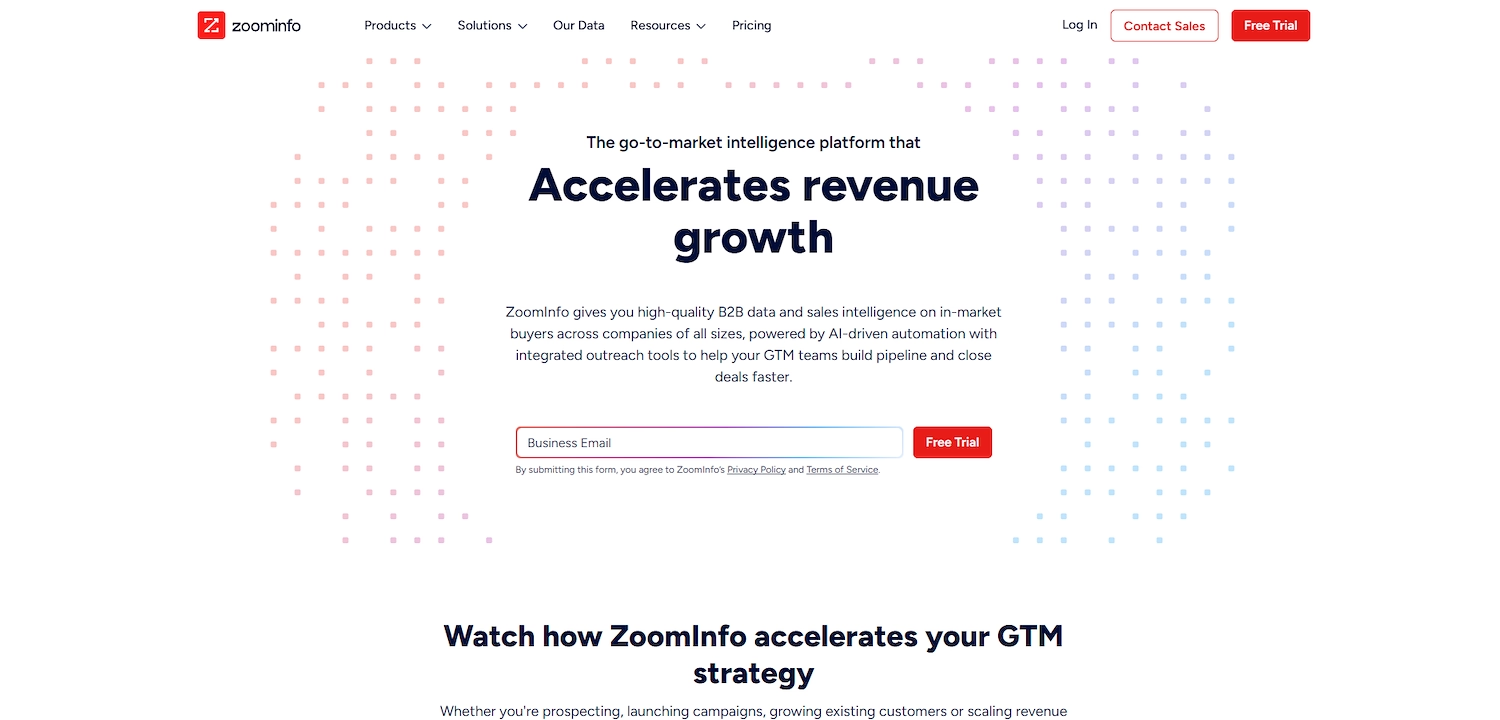
ZoomInfo SalesOS is a go-to-market intelligence platform for B2B organizations. It offers a database of company and contact information, plus buyer intent signals. Teams use it to build lead lists with verified contact details and find prospects.
The system also supports data enrichment and integrates with a customer's tech stack. It acts as a single source of truth for sales, marketing, and operations departments.
ZoomInfo SalesOS's Main Features
- Identifies prospects ready to buy using real-time intent signals.
- Analyzes call and meeting interactions with its conversation intelligence tool, Chorus.
- Turns anonymous website visitors into sales pipeline.
- Automates phone and email outreach.
How ZoomInfo SalesOS Compares to Lusha
Average Review score: 4.5/5 stars based on 8,738 G2 reviews.
- ZoomInfo provides buyer intent data, which helps identify prospects actively searching for solutions. Lusha does not offer this, so ZoomInfo allows for more proactive prospecting.
- It includes a conversation intelligence tool, Chorus, to analyze sales calls and meetings for coaching insights, a capability beyond Lusha's core data enrichment function.
- The platform has built-in sales engagement tools to automate outreach. While Lusha provides contact data, ZoomInfo combines data with the tools to act on it in one place.
- This tool can identify anonymous visitors on your website and turn them into leads, a feature that provides a source of prospects not available within Lusha's platform.
- Its database is more extensive and includes company data and intent signals, while Lusha focuses more on providing contact information.
Potential Drawbacks Compared To Lusha
- ZoomInfo SalesOS often requires annual contracts and has a higher price point, which might not suit smaller teams. Lusha, in comparison, sometimes offers more flexible, credit-based plans that are more budget-friendly for specific use cases.
- The platform can be complex and may require a longer implementation time of about one month. In contrast, Lusha is often noted for its user-friendly interface and quick setup, an advantage for teams that need immediate results.
- This tool is a comprehensive go-to-market platform with many features. For teams that only need a simple way to find contact details, its broad functionality might be excessive compared to Lusha's straightforward approach.
Pricing and Budget Considerations
Lusha offers transparent monthly plans starting at $36 per user and includes a free tier, making it accessible for smaller teams. ZoomInfo operates on a custom quote basis with annual contracts, reflecting a higher price point suited for enterprise budgets.
2) Apollo.io
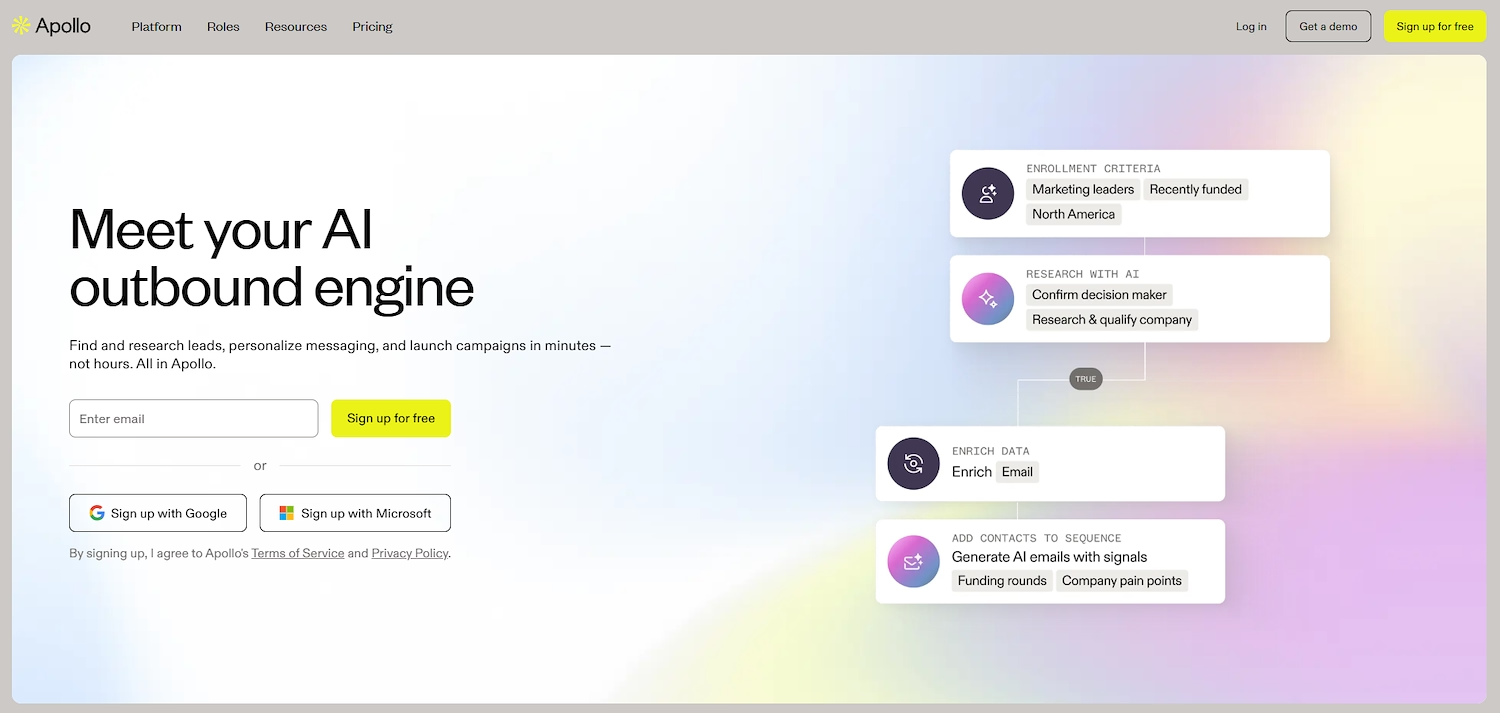
Apollo.io is a sales intelligence and engagement platform. It provides access to a large B2B database for lead discovery. Teams use it to find verified email addresses and phone numbers for prospects and build lists.
The platform also supports data enrichment to keep CRM records current and complete. It combines its database with sales engagement tools for a unified workflow.
Apollo.io's Main Features
- Provides access to a large B2B database for building lead lists.
- Finds verified contact information, including email addresses and phone numbers.
- Enriches CRM data to keep prospect and customer records up to date.
- Includes sales engagement tools to manage outreach within the same platform.
How Apollo.io Compares to Lusha
Average Review score: 4.7/5 stars based on 8,904 G2 reviews.
- Apollo.io combines a large contact database with built-in sales engagement tools. This differs from Lusha, which primarily provides contact data and requires other tools for outreach.
- The platform provides access to a database of over 210 million contacts. This extensive data source supports large-scale prospecting efforts, whereas Lusha's focus is more on individual contact lookups.
- It includes buyer intent data that helps sales teams find companies actively looking for solutions. Lusha does not offer this feature, so prospecting is more reactive.
- The tool uses an intelligence engine to give recommendations and analytics for the sales process. This provides a layer of guidance that is not part of Lusha's core data-finding function.
Potential Drawbacks Compared To Lusha
- Some users find that Apollo.io has a steeper learning curve due to its extensive features. Lusha, in comparison, is often praised for its user-friendly interface that allows for a quicker start.
- The platform's data accuracy can sometimes be inconsistent, according to user feedback. For teams that prioritize verified direct dials, Lusha's focused data enrichment may provide more reliable results.
- Apollo.io is an all-in-one platform, which might be excessive for teams needing only contact information. Lusha's straightforward approach is often better suited for simple data lookup tasks.
Pricing and Budget Considerations
Lusha's paid plans are more budget-friendly for individual users, starting at $36 per month, while Apollo.io's begin at $49. However, Apollo.io's multi-user plans can offer better value for small teams. For the most current information, check the pricing on Apollo.io's official website.
3) RocketReach
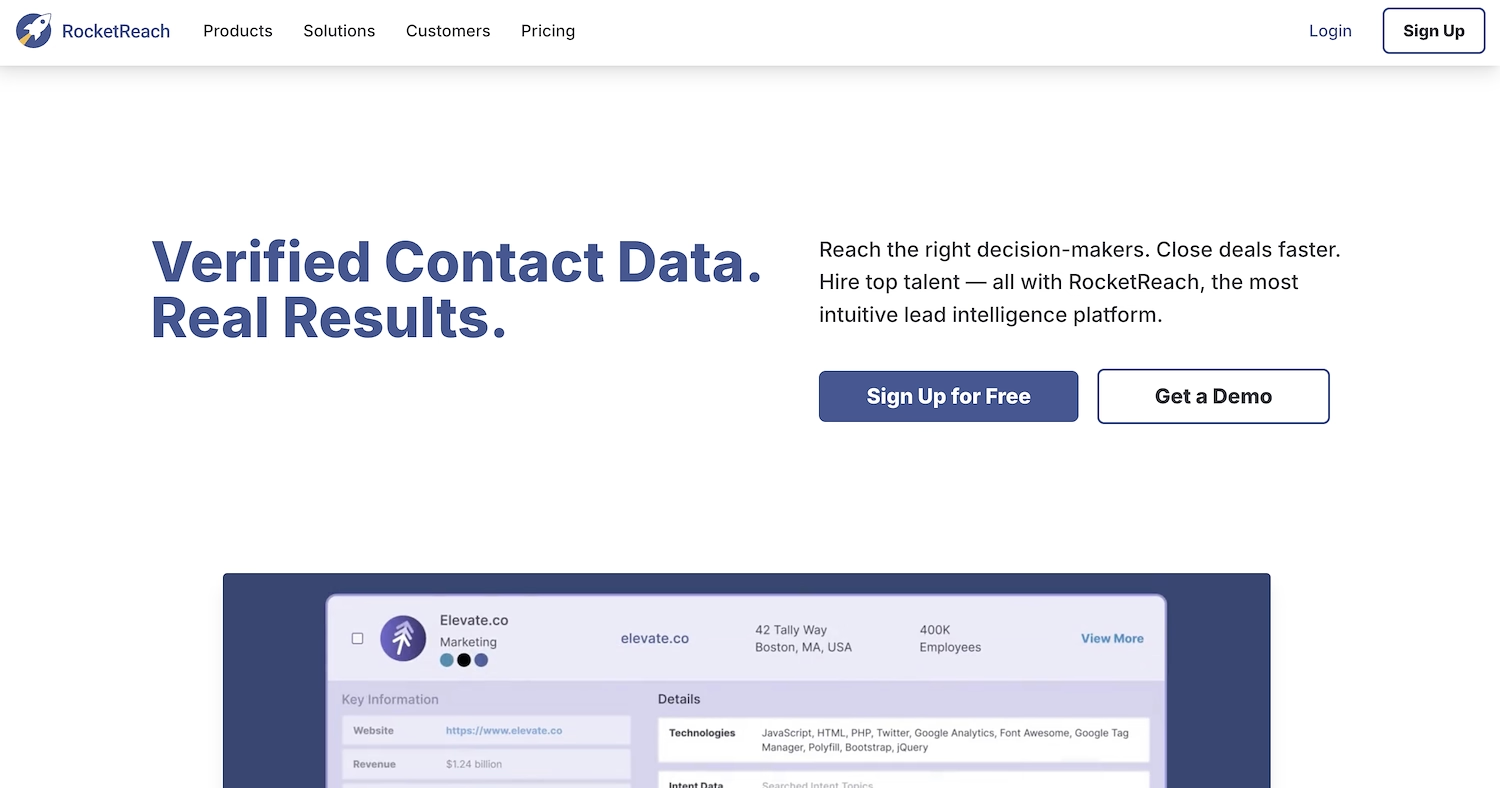
RocketReach provides access to a large database of professional and company profiles. Teams use it to find contact details, such as emails and phone numbers, to connect with specific decision-makers.
The platform also offers data enrichment for contact lists and supports bulk lookups. This feature allows users to append information to multiple records simultaneously.
RocketReach's Main Features
- Provides access to a large database of professional and company profiles.
- Finds contact details, such as emails and phone numbers, to connect with specific decision-makers.
- Offers data enrichment for contact lists and supports bulk lookups.
How RocketReach Compares to Lusha
Average Review score: 4.4/5 stars based on 918 G2 reviews.
- RocketReach provides access to a database of over 700 million professionals. This large scale supports extensive list creation, a different focus from Lusha's individual contact verification.
- The tool includes intent data, which helps identify companies actively searching for solutions. This feature allows for more timely outreach compared to Lusha's contact-focused data.
- It offers specialized data for niche sectors like healthcare. This provides targeted information for specific industries, an area where Lusha is more general.
- The platform's advanced search filters help users create highly specific prospect lists from its large database. This is a slight contrast to Lusha's direct, one-off lookup functionality.
Potential Drawbacks Compared To Lusha
- RocketReach's paid plans start at a higher price point than Lusha's. Its Essentials plan is more expensive than Lusha's entry-level paid tier, which can be a factor for smaller teams or individual users with limited budgets.
- Some users report that the contact information in RocketReach can occasionally be outdated. This might result in a higher bounce rate for email campaigns when compared to Lusha, which focuses heavily on real-time contact verification.
- The platform offers many features, including an API and advanced search filters. For teams that only need a simple tool for individual contact lookups, Lusha's more straightforward interface might be a better fit and require less training.
Pricing and Budget Considerations
Lusha's Pro plan is $36 per user per month, while RocketReach's Essentials plan starts at $99. This makes Lusha more cost-effective for smaller teams, whereas RocketReach's plans offer more lookups at a higher price. For current pricing, visit RocketReach's official website.
4) Seamless.AI
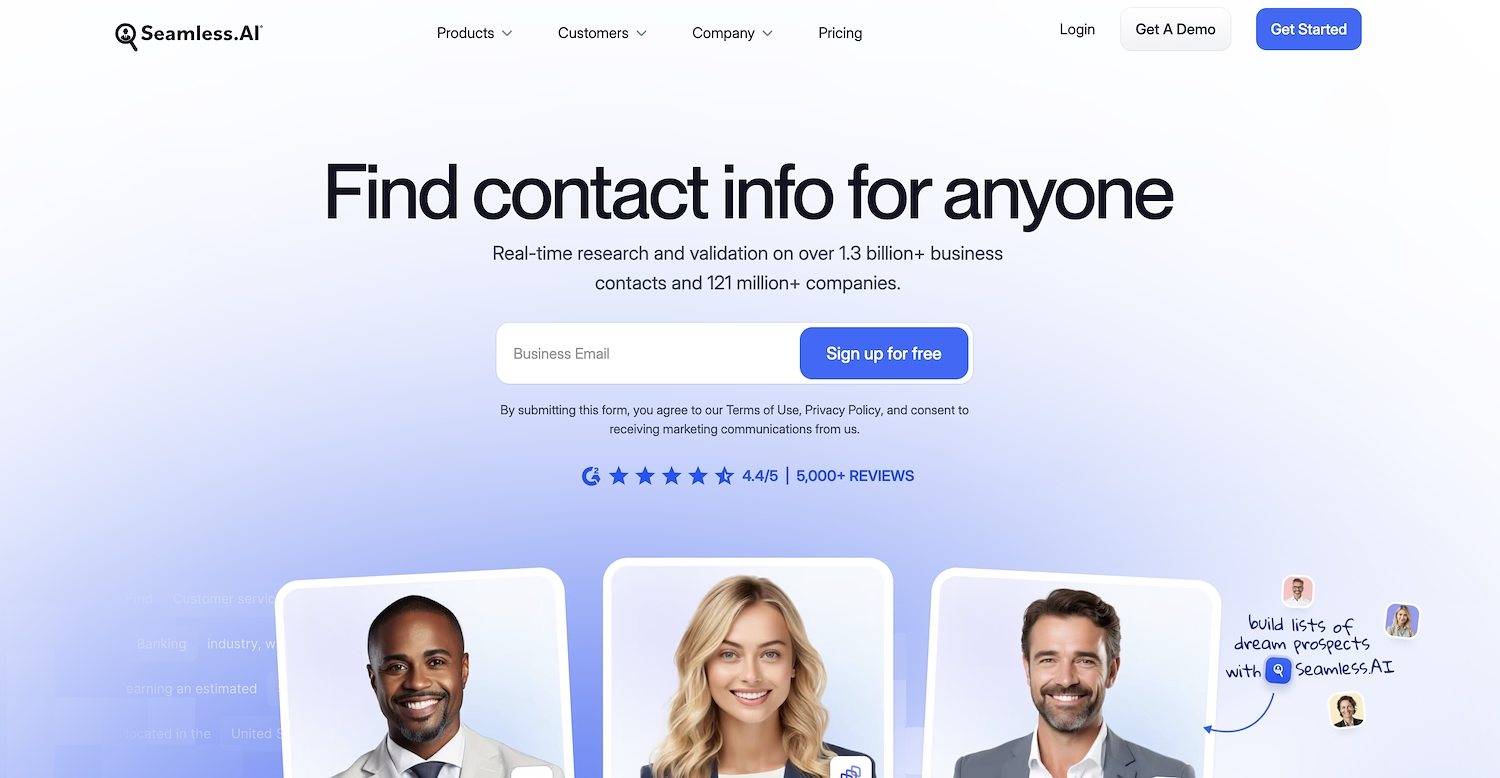
Seamless.AI is a sales software that helps B2B teams find verified contact information like cell phones, emails, and direct dials. The platform uses an AI engine to research and verify data in real-time. It provides a B2B database and supports data enrichment to keep records current.
Seamless.AI's Main Features
- Uses an AI engine to research and verify contact information in real-time.
- Identifies prospects who are ready to buy through its buyer intent data feature.
- Monitors job changes among prospects and customers, automatically delivering updated contact details.
- Automates list-building to help maintain a full sales pipeline.
How Seamless.AI Compares To Lusha
Average Review score: 4.4/5 stars based on 5,067 G2 reviews.
- Seamless.AI uses an AI engine to find and verify contact information in real-time. This approach differs from Lusha, which also provides accurate data but does not emphasize a real-time AI verification process.
- It provides buyer intent data, which helps sales teams find prospects who are actively searching for solutions. This allows for more timely outreach compared to Lusha, which does not offer intent signals.
- The platform monitors job changes among prospects and automatically delivers their updated contact details. This feature helps maintain contact lists and identify new opportunities, a function not present in Lusha.
- This tool automates list-building to help keep the sales pipeline full. While users can create lists with Lusha, Seamless.AI presents this as a core automated function for continuous lead generation.
Potential Drawbacks Compared To Lusha
- Some users find Seamless.AI has a steeper learning curve due to its wide range of features. This is different from Lusha, which is often noted for its simple interface and quick setup.
- The contact information in Seamless.AI can sometimes be outdated, according to user feedback. This might result in a higher email bounce rate compared to Lusha, which is known for its focus on data accuracy.
- Its credit system can feel restrictive for heavy users, and some report issues with auto-renewal billing. Lusha, in contrast, offers more transparent and flexible monthly plans that can be easier to manage.
Pricing and Budget Considerations
Lusha provides transparent pricing with plans starting at $36 per user, which is suitable for teams that need predictable costs. Seamless.AI uses a custom quote model without public pricing, a common approach for enterprise solutions. For detailed quotes, check Seamless.AI's official website.
5) Hunter
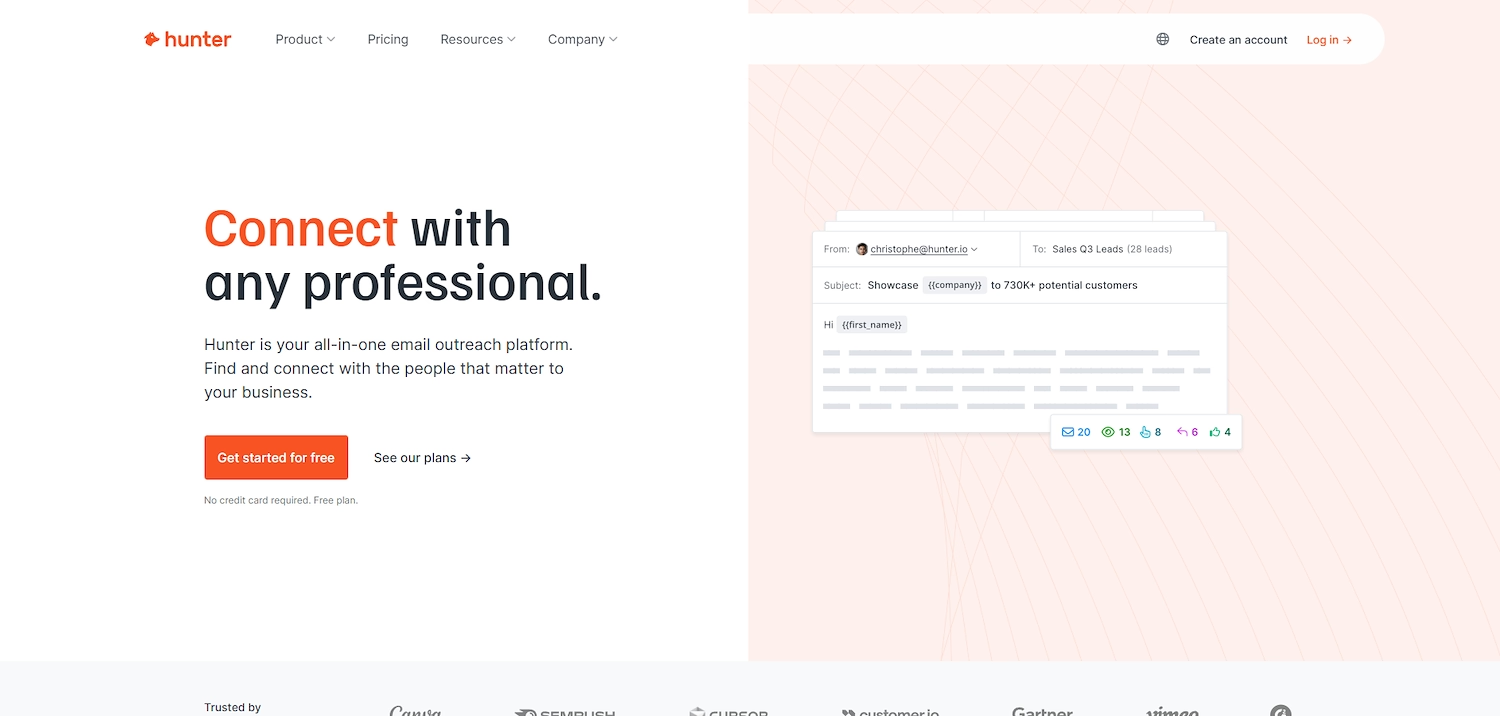
Hunter is a platform used to find professional email addresses. It allows teams to discover contacts through a domain search feature and verify the deliverability of emails. The tool is primarily for B2B outreach.
Beyond email discovery, it provides data enrichment to update contact lists and includes a B2B database. Some plans also offer a phone number finder to complete prospect profiles. Teams use this information to build accurate outreach lists.
Hunter's Main Features
- Finds all publicly available email addresses from a specific domain name or URL.
- Validates email lists to reduce bounce rates and protect sender reputation.
- Composes personalized messages and schedules follow-ups with a built-in cold-email suite.
- Lists websites by the technology stack they use for targeted prospecting.
How Hunter Compares To Lusha
Average Review score: 4.4/5 stars based on 592 G2 reviews.
- Hunter includes a built-in cold email suite to compose messages and schedule follow-ups. This is different from Lusha, which provides contact data but requires a separate tool for outreach campaigns.
- The platform's domain search feature finds all publicly available email addresses from a specific company website. This offers a broad discovery method, while Lusha is often used for more targeted, individual contact lookups.
- It has a dedicated email verification tool to check lists and reduce bounce rates. While Lusha also provides verified contacts, Hunter offers this as a standalone function for cleaning existing data.
- This tool allows users to find prospects based on the technology stack their websites use. This provides a specific targeting filter for outreach that is not available in Lusha.
Potential Drawbacks Compared To Lusha
- Hunter focuses primarily on email addresses. In contrast, Lusha also provides direct-dial phone numbers, so it may be more suitable for teams that use phone outreach.
- The tool gathers publicly available data from the web. Lusha, in contrast, often combines information from various sources, which can sometimes result in more complete contact profiles.
- It is built around domain searches and bulk tasks. For users who need to quickly find contact information for one person at a time, Lusha's browser extension can offer a more direct workflow.
Pricing and Budget Considerations
Both tools offer a free plan. Lusha's Pro plan starts at $36 per user per month, making it a more affordable entry point than Hunter's $49 Starter plan. This positions Lusha as a better option for individuals or small teams on a tighter budget.
Consider 11x for Sales Automation
If your goal is sales task automation, not just data acquisition, consider 11x. Our digital workers can manage prospect discovery, outreach, and CRM updates. This approach adds automation to your sales process without an increase in headcount.
At 11x, we run your sales playbook. Our agent Alice finds prospects, enriches their data, and manages outreach. Julian qualifies inbound leads and schedules meetings. Our platform combines data, outreach, and email warmup to replace multiple tools in your GTM stack.
Book a demo to see it in action.
6) Snov.io
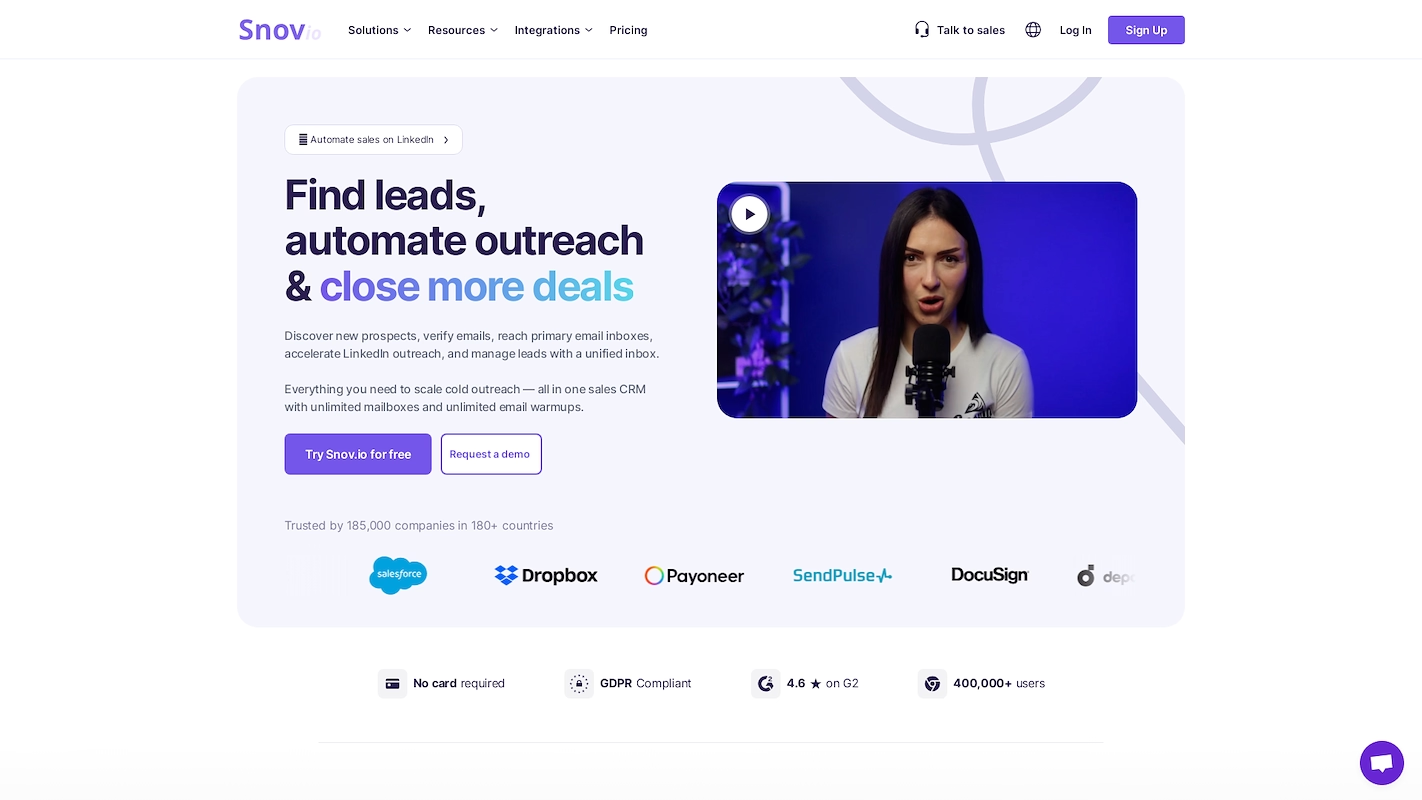
Snov.io is a sales automation platform for lead generation and outreach. It offers tools to find and verify email addresses, manage leads, and launch automated email drip campaigns. The system includes a B2B database, data enrichment, and a phone number finder to support sales and marketing teams.
Snov.io's Main Features
- Manages cold email and multichannel campaigns with unlimited sender accounts and a unified inbox.
- Includes a built-in sales CRM with Google Calendar sync and automated deal stage management.
- Offers a deliverability toolkit with automated email warm-up and inbox placement checkers.
- Employs a 7-tier email verifier to provide 98% accuracy and bypass gray-listing.
How Snov.io Compares to Lusha
Average Review score: 4.6/5 stars based on 450 G2 reviews.
- Snov.io includes a sales automation platform to run email drip campaigns. This differs from Lusha, which provides contact data but requires a separate tool for outreach.
- It offers a built-in sales CRM to manage leads and deals directly within the platform. In contrast, Lusha focuses on data enrichment for external CRM systems.
- The tool provides a deliverability toolkit with an email warm-up feature to help protect sender reputation, a function not available in Lusha.
- Snov.io uses a 7-tier email verification process that aims for 98% accuracy. While Lusha also provides verified contacts, Snov.io specifies its multi-step system.
Potential Drawbacks Compared To Lusha
- Snov.io's platform centers on email outreach. For teams that rely heavily on phone calls, Lusha often provides more direct-dial phone numbers, which can be a more suitable option for their sales process.
- The tool includes many features like a CRM and campaign automation. This can create a steeper learning curve compared to Lusha, which is known for its simple interface and quick setup for contact lookups.
- Some users report that Snov.io's contact data can sometimes be less accurate. This might be a consideration for teams that need high data reliability for individual contacts, an area where Lusha often performs well.
Pricing and Budget Considerations
Both tools offer a free plan. Lusha's entry-level Pro plan is $36 per user per month, while Snov.io's Starter plan is slightly more at $39 per month. This makes Lusha a more budget-friendly option for individuals seeking the lowest-priced paid tier.
7) Cognism
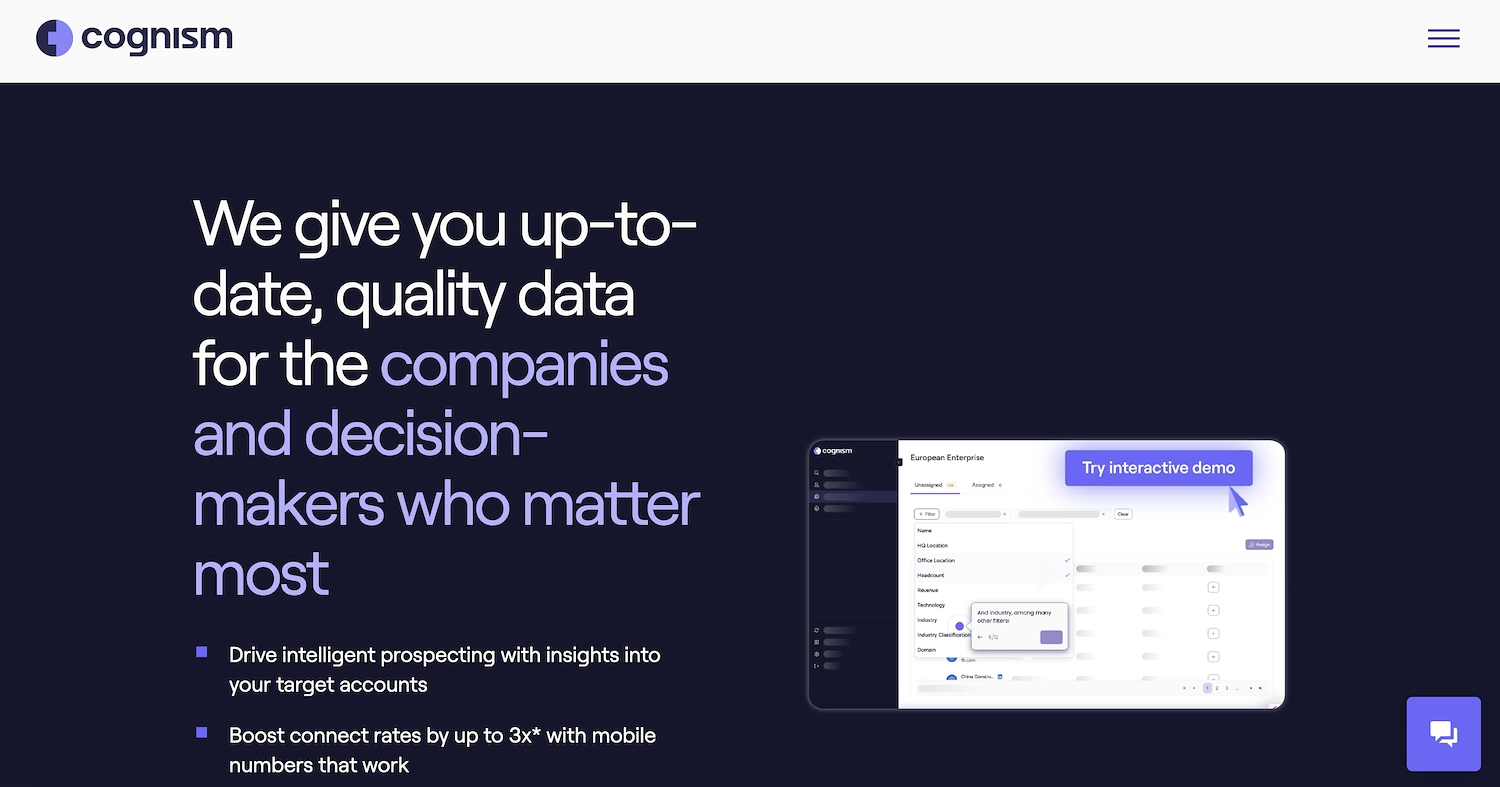
Cognism is a sales intelligence platform with a B2B database. Teams use it to find email addresses and phone numbers for prospects. The service also offers data enrichment to maintain accurate contact lists. It provides go-to-market teams with verified contact and company data for outreach.
Cognism's Main Features
- Provides phone-verified, human-checked mobile numbers, known as Diamond Data®, to increase connect rates.
- Offers extensive coverage of mobile numbers and email addresses for contacts in the UK and EMEA regions.
- Surfaces buying signals from hiring trends, funding rounds, and changes in technology stacks.
- Supplies data on VP-level and higher decision-makers that is screened against Do-Not-Call lists.
How Cognism Compares To Lusha
Average Review score: 4.6/5 stars based on 1,033 G2 reviews.
- Cognism offers phone-verified mobile numbers, known as Diamond Data®, which are human-checked to increase connect rates. This is a different approach to data verification than Lusha's standard process.
- It provides extensive data coverage for contacts in the UK and EMEA regions, offering more depth in these markets compared to Lusha's more global database.
- The platform screens its data against international Do-Not-Call lists. This feature helps sales teams maintain compliance, a specific function not highlighted in Lusha.
- This tool provides buyer intent data from signals like hiring trends and funding. This allows for more timely outreach, whereas Lusha focuses on providing contact information without intent signals.
Potential Drawbacks Compared To Lusha
- Cognism's pricing model is typically based on custom quotes and annual contracts, which can be a significant investment. Lusha, in comparison, offers a free plan and transparent monthly pricing, making it more accessible for smaller teams.
- The platform can have a learning curve and may take about a month to implement. In contrast, some users find Lusha more straightforward, with a simple interface that allows for a quicker start.
- For teams that only need to find individual contact details quickly, Cognism's broad set of features might be more than necessary. Lusha's browser extension, for example, offers a more direct workflow for simple, one-off lookups.
Pricing and Budget Considerations
Lusha offers transparent monthly plans starting at $36 per user, making it accessible for smaller teams. Cognism operates on a custom quote and annual contract basis, which is more common for enterprise solutions. For detailed pricing, it is best to check Cognism's official website.
8) UpLead
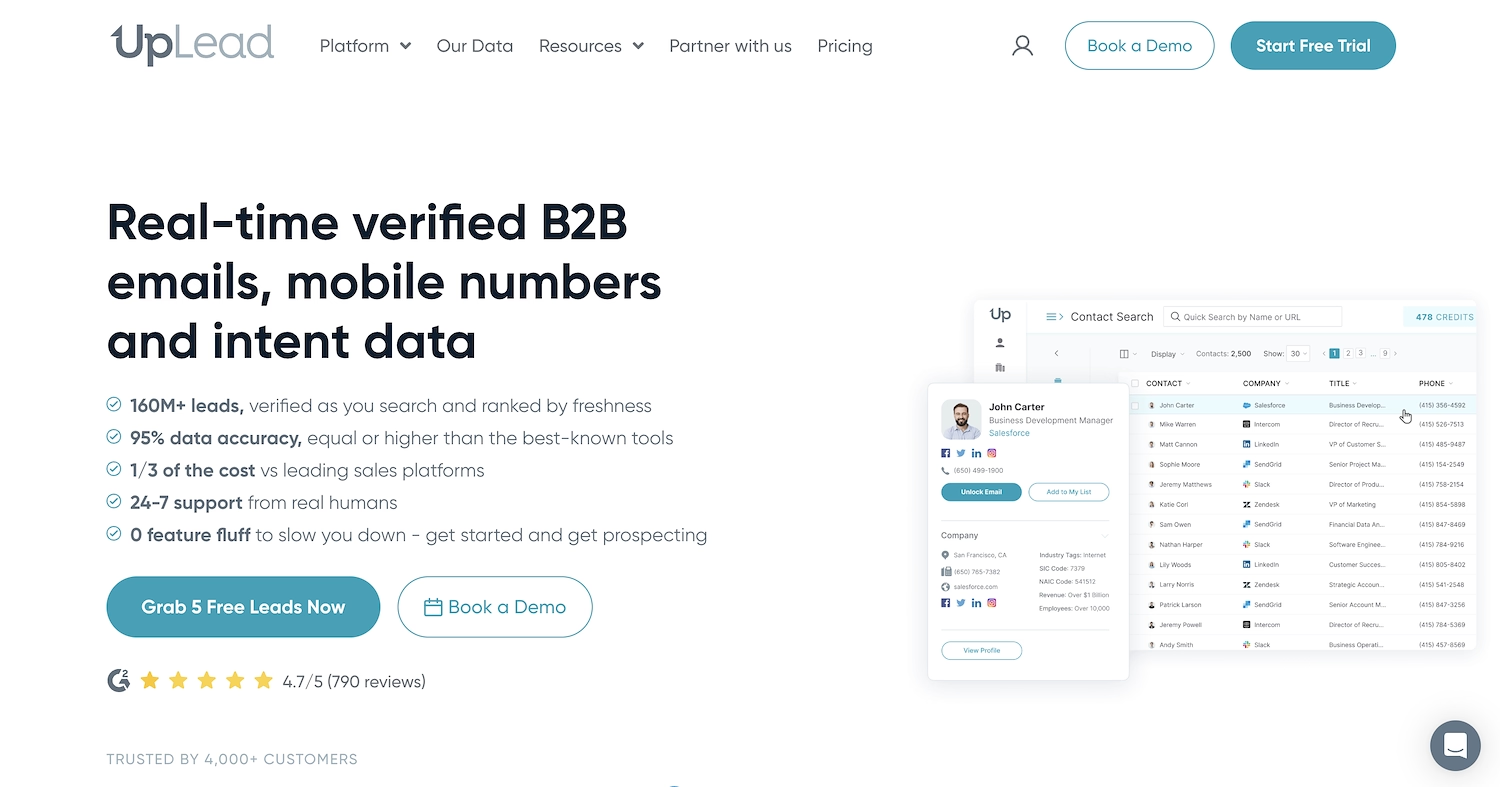
UpLead is a B2B prospecting platform with a contact and company database. Teams use it to build targeted lists with verified emails and phone numbers. The platform also supports data enrichment to append information to existing records and offers real-time email verification to ensure data accuracy for outreach campaigns.
UpLead's Main Features
- Provides over 50 search filters, including intent data, to identify in-market buyers.
- Verifies emails in real-time to ensure data accuracy before outreach.
- Offers a lead builder and data enrichment to build lists and update existing contact records.
- Integrates with CRMs like Salesforce and HubSpot, as well as Zapier, to automate workflows.
How UpLead Compares to Lusha
Average Review score: 4.7/5 stars based on 797 G2 reviews.
- UpLead verifies emails in real-time at the point of download. This process ensures data is accurate at the moment of use, which is a different approach compared to Lusha's standard data validation.
- It includes buyer intent data, which helps sales teams find companies actively looking for a solution. This is a feature for proactive prospecting that Lusha does not offer.
- The tool provides over 50 search filters to build highly specific prospect lists. This offers more granular control for list creation than Lusha's focus on individual contact lookups.
- UpLead's integration with Zapier allows for more extensive workflow automation across various sales tools. This provides more flexibility compared to Lusha's direct CRM data-syncing capabilities.
Potential Drawbacks Compared To Lusha
- UpLead's starting paid plan is more expensive than Lusha's entry-level plan. This makes Lusha a more accessible choice for individuals or small teams with a limited budget.
- The platform's extensive search filters might feel complex for users who only need to find contact details for a single prospect. Lusha's browser extension sometimes offers a more direct workflow for simple, one-off tasks.
- Some users report that contact data can occasionally be outdated, which might lead to higher email bounce rates. In comparison, Lusha's primary focus on contact verification is often noted for its data accuracy.
Pricing and Budget Considerations
Both tools offer a free plan. Lusha's entry-level Pro plan is $36 per user per month, while UpLead's Essentials plan starts at $99 per month. This makes Lusha a more cost-effective option for individuals or small teams with smaller budgets.
9) Clearbit
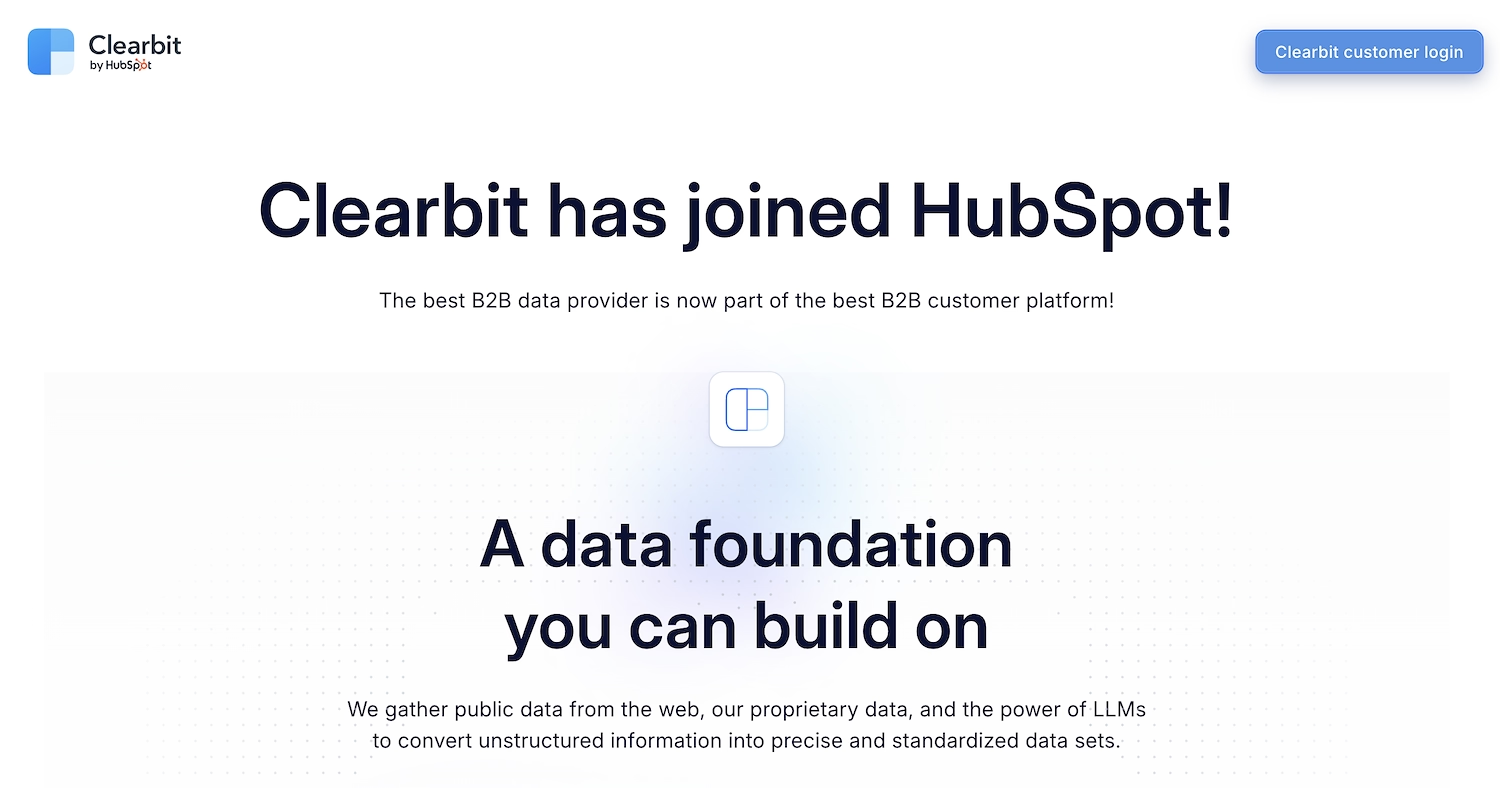
Clearbit is a marketing data platform for B2B companies. It offers a database and enrichment tools to build a complete view of any prospect or customer. Teams use it to find contact details, like emails and phone numbers, and to maintain accurate CRM records.
Clearbit's Main Features
- Enriches records by appending over 100 data points about a company, its technology, and employees.
- Identifies anonymous companies visiting a website to detect visitor intent.
- Shortens website forms by hiding or autofilling known fields.
- Integrates with HubSpot to automate lead scoring and routing workflows.
How Clearbit Compares To Lusha
Average Review score: 4.4/5 stars based on 626 G2 reviews.
- Clearbit enriches records with over 100 data points, including company technology. This provides a more detailed profile compared to Lusha's focus on contact information.
- It identifies anonymous companies visiting a website, which creates a new source of leads. This is different from Lusha's method of finding specific, known contacts.
- The platform can shorten website forms by autofilling known fields to help increase lead conversion rates, a marketing function not found in Lusha.
- This tool integrates with HubSpot to automate lead scoring and routing. This offers a deeper level of workflow automation than Lusha's direct data syncing.
Potential Drawbacks Compared To Lusha
- Clearbit's pricing is based on custom quotes, which often suits larger teams with bigger budgets. Lusha, in contrast, offers transparent monthly plans and a free tier, making it more accessible for individuals or small businesses.
- The platform is a comprehensive marketing data tool. For teams that only need to find contact information for individual prospects, Lusha's more focused approach and simple browser extension can provide a more direct workflow.
- Some users find that Clearbit's primary strength is in company and email enrichment. Teams that rely heavily on phone outreach might find Lusha offers more direct-dial phone numbers for their prospecting needs.
Pricing and Budget Considerations
Lusha offers transparent monthly plans starting at $36 per user, making it accessible for teams with predictable budgets. In contrast, Clearbit uses a custom quote model common for enterprise solutions, so you will need to visit Clearbit's official website for pricing details.
10) Lead411
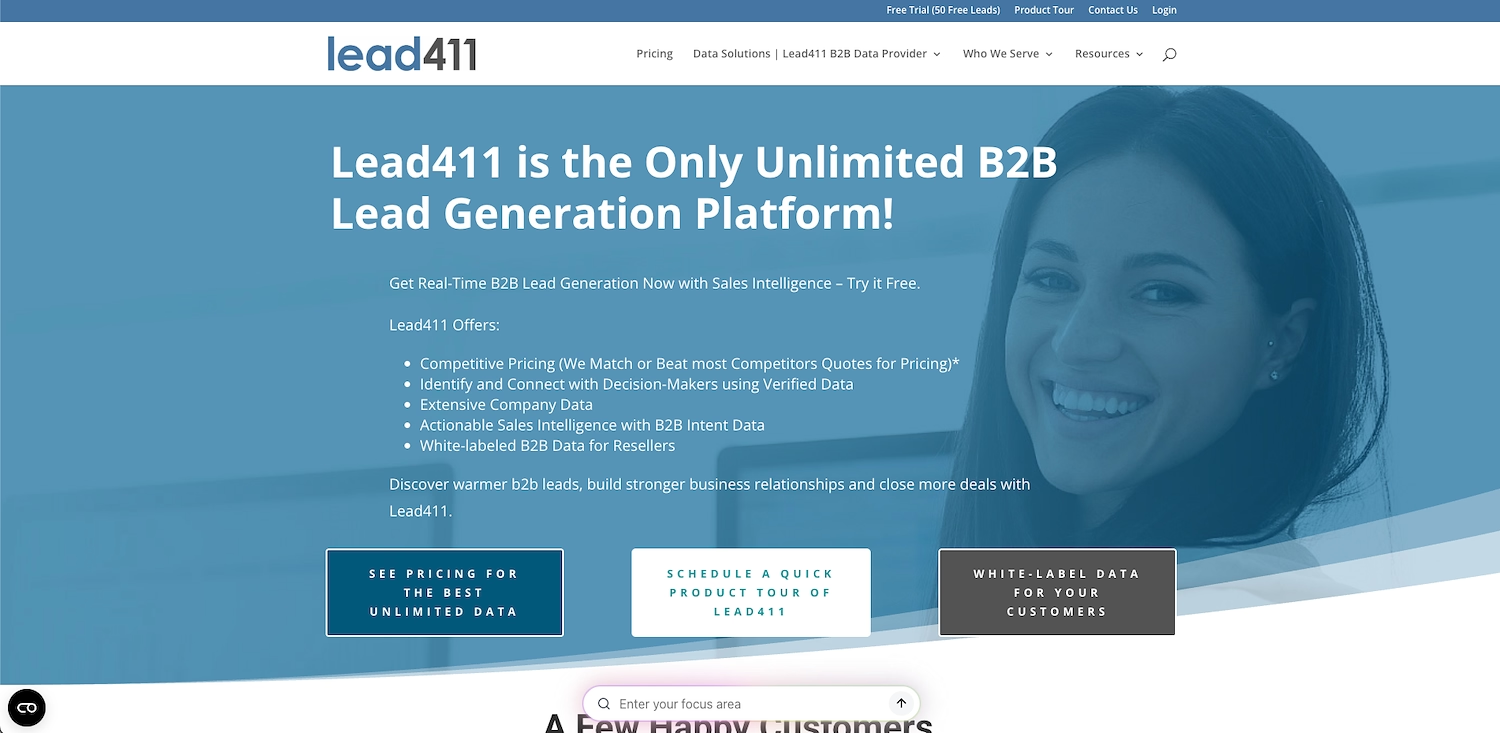
Lead411 is a B2B data provider with a contact database for sales teams. It provides verified emails and direct-dial phone numbers. The platform also offers data enrichment to keep records current and includes buyer intent signals to help focus outreach.
Lead411's Main Features
- Provides sales intelligence data points, including recent funding, hiring plans, and IPO announcements.
- Identifies companies looking for solutions using buyer intent data powered by Bombora.
- Automates email outreach with a built-in feature for setting up cadences and campaigns.
- Tracks key lead indicators automatically in an A.I. dashboard.
How Lead411 Compares To Lusha
Average Review score: 4.5/5 stars based on 466 G2 reviews.
- Lead411 provides buyer intent data powered by Bombora to identify companies actively searching for solutions. This allows for more timely outreach compared to Lusha, which does not offer intent signals.
- It offers specific sales intelligence data points, such as recent funding and hiring plans. This provides more context for outreach than Lusha's focus on contact information.
- The platform includes a built-in email automation feature for setting up outreach campaigns. In contrast, Lusha provides contact data but requires a separate tool to send emails.
- An A.I. dashboard automatically tracks key lead indicators to help prioritize opportunities. This is a feature for lead management that is not part of Lusha's platform.
Potential Drawbacks Compared To Lusha
- Lead411's basic plan has a higher monthly cost and requires an annual contract. In comparison, Lusha offers more flexible monthly plans at a lower starting price, which can be a better fit for teams that need more budget flexibility.
- Some users report the platform can feel clunky. This contrasts with Lusha, which is often noted for its user-friendly interface and simple workflow, especially for teams that need to find contact information quickly without extensive training.
- It is a comprehensive platform with built-in email automation. For teams that only need a simple tool to find contact details, its broad functionality might be more complex than Lusha's straightforward, lookup-focused approach.
Pricing and Budget Considerations
Lusha’s Pro plan is available for $36 per user per month, offering monthly flexibility. In contrast, Lead411’s entry-level paid plan starts at $75 per user per month with an annual contract, which makes Lusha a more budget-friendly option for teams that want to avoid long-term commitments.
Which One Should You Go With?
The right Lusha alternative depends on your team's specific needs, budget, and existing tech stack. This guide has outlined several options to help you make an informed decision.
If your focus is sales task automation over data acquisition, 11x offers a different approach. Our platform uses digital workers to manage prospect discovery, outreach, and CRM updates, and combines multiple tools into one.




